|
Skating parties like this turn-of-the-century costume ball were one of the chief forms of entertainment for Ottawa's high society and vice-royalty. |
|
The Capital City of Hockey |
||
|
"The guys were home . . . and the town was jumping with sporting men. Ottawa was a small town but it produced so many hockey players." Jake Dunlap |
|
Soon after Confederation in 1867, Ottawa gained renown not only as the national capital but also as a "sporting town," with timber barons, military officers, government officials, wealthy professionals, and vice-royalty backing teams and participating themselves in cricket, rowing, rugby, horseracing, curling, boxing, lacrosse, toboganning, snowshoeing, and "shinnying" as the precursor of hockey was called. Many Ottawa "sporting men" before the turn of the century were so-called gentlemen, with family names like Booth, Gilmour, Kirby, Carson, Devlin, Masson even Lord Stanley, Governor-General of Canada from 1888-1891 and donor of The Stanley Cup, sponsored the Rideau Rebels hockey team on which'his two sons, Arthur and Edward, played. From teams like the Rebels, the Capitals, the Victorias, the Bronsons, the Electrics, and the various clubs scattered throughout the Ottawa Valley emerged the players who led the Ottawa Senators "The Silver Seven" to three consecutive Stanley Cup victories in 1902-03, 1903-04, 1904-05, and then again in 1908-09 and 1910-11 prior to the founding of the N.H.L. in 1917. From 1917 to 1934 when the team was disbanded, The Senators would win another four Stanley Cups, in 1919-20, 1920-21, 1922-23, and 1926-27. During this era, Ottawa could rightfully be called not only the capital of Canada but also the capital of hockey. This chapter in the story of The Senators gives an impression of Ottawa "the sporting town" and "capital of hockey" culminating in the achievements of The Silver Seven. An impression of the importance of sports in Ottawa social, political, and cultural life in the 1880s and 1890s can be gleaned from this account of the event of the winter season, described by C.H. Ireson in his recollections published in The Ottawa Citizen: In those days Rideau Hail had two open-air skating rinks, two toboggan slides, and a covered curling rink . . . Governor and Lady Lansdowne gave two skating and tobogganing parties at Rideau Hall every winter, parties termed by the Governor-General as his "Arctic Ceremonies." In those days all members of snowshoe and toboggan clubs wore white blanket cloth coats, knickerbockers, bright-colored stockings, sashes and knitted toques. Rideau Hall colors were "royal" purple stockings and toques and red sashes. A collection of 300 people thus gorgeously arrayed on rinks all fringed with colored fairy lamps and festoons of Japanese lanterns produced a wonderfully festive effect. Supper was served in the long covered but unheated curling rink |
|
Skating parties like this turn-of-the-century costume ball were one of the chief forms of entertainment for Ottawa's high society and vice-royalty. |
|
where the tables were set out with silver branched candlesticks. The servants waited on tables in heavy fur coats and caps and the silver vases on the tables were filled with sprays of spruce and fir.
This vice-regal sporting tradition was continued by subsequent tenants of Rideau Hall. Lady Aberdeen, in a book co-authored with her husband the Governor-General, remembered her first winter in Canada 1982:
Our first winter introduced us to the delights of Canadian winter sports. It seemed to be a little disconcerting for our Canadian friends at first to find they had unearthed a Governor-General who was quite at home at curling and skating, and who had often used a sleigh at home. But hockey on the ice was new to us and our children, and the staff entered into this sport with enthusiasm as also into the tobogganing from the high slide erected in the Government House grounds and leading right down to the Ottawa River. I certainly thought I was not cut out for this sort of amusement but, in a rash moment, I gave Haddo (my son) a promise I would do anything he asked of me on his seventeenth birthday. To my horror I found I had pledged myself to going down the toboggan slide with him! I felt my last moment had arrived but it |
|
Sir F. Middleton strikes a dashing pose in his extraordinary skating costume, circa 1889. |
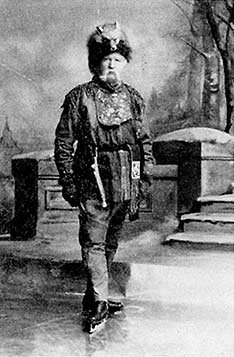 |
|
|
had to be gone through with. Under the children's careful tutelage I risked it time and time again and, in the end, enjoyed it as much as anyone. Our Saturday skating and tobogganing parties with we gave weekly were a great feature of Government House life during the winter. All were invited to these parties who wrote their names in our Visitors' Book, and children were included, so the scene was |
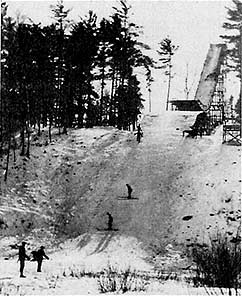 |
The Rockcliffe Park ski-jump, shown here in 1921, was a popular sporting scene until the 1950s. |
|
a very gay and merry one, blanket coats and costumes with belts of many colors woven by the French 'habitants' being the correct attire, together with soft woolen caps and long woolen mitts. Chocolate, piping hot, with whipped cream was considered one of the necessary accompaniments to these entertainments where everybody met and fraternized.
The most famous vice-regal booster of hockey as a national sport was Lord Stanley, whose two sons learned to play the game on the rinks of Rideau Hall. Lord Stanley sponsored the Rideau Rebels from 1889-1891, when the team challenged the Ottawa City Hockey Club for the championship of Canada. The Rebels lost to the City Club, which then went on to defeat a Queen's University and an Osgoode Hall team for the Cosby Cup and Dominion Championship. Meanwhile, The Rebels made a viceregal tour of Ontario promoting the game in Kingston, Lindsay, Toronto, and Kitchener. Lord Stanley's great claim to hockey fame is, however, his donation of The Stanley Cup in 1891.
As reported in The Ottawa Citizen, Lord Stanley, through his proxy Lord Kilcoursie, proposed the idea of a challenge cup for the champion hockey team in the Dominion during an awards banquet honoring the Ottawa City Hockey Club, as reported in the local papers:
THE CHAMPIONS DINED An Enjoyable Gathering of Admirers of the Hockey Team
The members of the Ottawa Hockey Club will always hold dear to their memory recollections of the banquet tendered them last evening in the Russell House. It was under the auspices of the Ottawa Amateur Athletic Club. About seventy-five of the team's most enthusiastic admirers were seated at the table. The president of the association, Mr. J.W. McRae, presided with Mr. Russell, captain of the team, at his right, and Mr.Jenkins at his left. The vice-presidents' chairs were occupied by Mr. P.D. Ross and Mr. Desbarats. When all appetites had been satisfied, Mr. McKay proposed the health of the Queen. Mr. Ross next proposed the toast of the Governor-General Lord Stanley, and in a few remarks referred to the great interest manifested in hockey by His Excellency. Lord Kilcoursie responded, and read the following letter from His Excellency:
I have for some time past been thinking that it would be a good thing if there were a challenge cup which should be held from year to year by the champion hockey team in the dominion. There docs not appear to be any such outward and visible sign of championship at present, and considering the general interest which the matches now elicit, and the importance of having the game played fairly and under rules generally recognized, I am willing to give a cup which shall be held from year to year by the winning team. * I am not quite certain that the present regulations governing the arrangement of matches give entire satisfaction, and it would be worth considering whether they could not be arranged so that each team would play once at home and once at the place where their opponents hail from.
Lord Kilcoursie then stated that Capt. Colville, who was at present in England, had been commissioned by the Governor to order the cup. It would be held here by trustees till the end of next season, and then presented to the champions. The reading of the letter was greeted with enthusiastic applause. The president proposed the health of the Ottawa hockey team, which was drunk by their friends, who stood upon their chairs. The first of the team to respond was the amiable captain, Mr. Russell, who did great honour to his team in a speech that was full of humour, and which was heartily appreciated by all present. The other members of the team then spoke in the following order: F.M.S. Jenkins, H. Kirby,J. Kerr, W.C. Young, A. Morel, and C. Kirby. The last mentioned delivered his oration while mounted upon the table ... The president here read a telegram received from the Quebec team as follows: "Quebec regrets that she cannot send a delegate and do honour to the finest hockey team in Canada." The toast of the ladies, proposed by Mr. Russell, was responded to by Mr. Stowe and by C. Kirby and C. Bethane. After the toast of the press had been disposed of, Mr. J.W. de C. O'Grady proposed the toast of the O.A.A.C, which brought the president and Mr. P.B. Taylor to their feet. Speeches followed by Mr. Clarence Martin and Mr. Palmer, of the Rebels. Lord Kilcoursie sang a song appropriate to the occasion and all joined in the chorus, which was as: |
|
Then give three cheers for Russell The captain of the boys. However tough the tussle His position he enjoys. And then for all the others Let's shout as loud we may O-T-T-A-W-A. |
|
|
|
Lord Stanley (left), Governor-General of Canada, 1888-1893, sponsored
The Rideau Rebels and donated The Stanley Cup to the nation. P.D.Ross(right), teammate of Lord Stanley's sons on The Rideau Rebels, was appointed a trustee of the Cup. He later became publisher of The Ottawa Journal. |
|
|
Mr. Garvin of the Toronto News and Mr. Colson followed with songs, and the pleasant gathering dispersed after singing the national anthem and Auld Lang Syne. Lord Arthur Frederick Stanley's influence on hockey development in Canada did not limit itself to the donation of The Stanley Cup. In the 1890s the only fully organized league was the Amateur Hockey Association of Canada with the majority of its teams from Montreal, one of the several touted birthplaces of the game. Many of the Governor-General's staff were McGill University graduates, and when they moved to Ottawa to take government jobs they brought the love of hockey with them. |
|
Horse-racing on the ice of the Ottawa River, probably at Aylmer, was a popular spectator sport of the era. |
|
|
A stalwart Ottawa Lacrosse Club pose for their team photograph on the field at Lansdowne Park |
|
|
No doubt Lord Stanley longed to see an Ottawa team win his Stanley Cup. But Montreal maintained its dominance until 1902-03 when the Ottawa Senators, "The Silver Seven," began their domination. During this period from 1891-92 to 1902-03, hockey mania seized Ottawa. Junior and Senior teams sprang from almost every neighborhood, sponsored by local businesses. While the Ottawa City Hockey Club, renamed the Capital Hockey Team, challenged teams like the Montreal A.A.A., Montreal Victorias, and Montreal Shamrocks for The Stanley Cup in the Amateur Hockey Association of Canada League, their farm team, the Young Capitals, were pitting their strength against such outstanding junior performers as the Electrics, Aberdeens, Jim Enright's Victorias, |
|
|
Young "Caps"Hockey Team of '96. Back row, LEFT TO RIGHTGeorge Hyde, James Kimpton, Bill Sparks, Jack Tobin, Billie Powers. FrontJack Powers (of lacrosse fame), and Robert (Bob) Mulhall, who established a reputation for himself as an outstanding bike rider. |
|
Ottawa Seconds, New Edinburghs, a hard-hitting crew that sometimes came up The Valley from Buckingham, and a team bearing the banner of Garland's Wholesale and Drygoods House. The Garlands boasted some formidable young hockey players-in-training, such as Harvey Pulford, Forester McKinnon, Tom McNichol, and Tom Brown, The Young Caps produced such outstanding athletes as Bill Powers, Eddie and Paddy Murphy, and Bob Mulhall. Bob Mulhall also brought fame to the sporting city as a bike-rider in the days when bike-racing was at its peak and crowds surged through the gates of the old Metropolitan grounds at the east end of Pretoria Avenue to watch the race on one of the finest clay tracks in the country.
The Young Caps played most of their games in the old Dey's Arena on Laurier but sometimes played open-air against Enright's Victorias on the Nepean Street rink. A newspaper reporter in Ottawa one lime asked one of the Young Capitals if he would recall a humorous incident from hockey wars of the period. The Young Cap replied:
There was nothing funny about it. In those days we played nearly two hours at a stretch without any relief. Few of the trams carried any spares and when a fellow went out to play a game he had to . make up his mind that, barring serious incident, he was out there to the finish. The games weren't as strenuous as the brand of hockey we see now, but the long steady grind told on the players. Then, too, if there was any rough stuff we felt the full force of it because heavy padding was unknown. Even the goalkeepers had very little protection against flying pucks.
The Electrics ruled the Junior Hockey roost in Ottawa during the early nineties. The team was organized in 1892, the players for the most part being drawn from employees of the Chaudiere Electric company, forerunner of Ahearn's Ottawa Electric Company. Though their existence was short lived, old-timers and hockey buffs always maintained that they were "the smartest collection of junior players that ever came down the pike." They won almost every game they played against other members of the Junior League at that time, the Ottawa Juniors and the Aberdeens. That they vanquished the Ottawa Juniors was impressive since that team boasted such outstanding players as Percy Butler, Charlie Spittal, and Martin Rosenthal. During their first winter the Electrics won challenge games against both local and outside teams, including Perth and Carleton Place. In the winter of 1893-94 they joined the Ottawa City League and won the championship without losing a single game. The following winter the Electrics advanced by joining the Junior Amateur Hockey Association, then comprised of Montreal Hawthornes, Victoria Juniors of Montreal, Ottawa Juniors, and Montreal Maple Leafs. With Alf Smith on right wing they went on to become champions of the City League and champions of the Junior Amateur Hockey Association. Alf Smith turned pro with the Ottawa Senators and was with them for two Stanley Cups. The Electrics played most of their games at Dey's Arena on Laurier. It is said that they virtually revolutionized hockey with a passing system which they developed to a new art and which Alf |
|
Electric Hockey Team, 1893-94. Standing A.H. Farley, B.H. Baldwin. Middle row E. O'Neil, F. Nolan, Eddie Murphy, M.J. (Mike) Shea, Alf. Smith. Bottom W.E. Dey, P.J. (Paddy) Murphy. |
|
|
Smith continued on Silver Seven Stanley Cup teams when he played right wing with the great scorer Frank McGee at center. Another team which served as seed ing-ground was Enright's Boarders, later the Victorias, a team which in 1900 arose out of the enthusiasm of a group of ambitious youngsters who made the old Victoria Rink their rendezvous on winter evenings after working hours. They decided to organize themselves into a legitimate hockey team playing games against other Junior Sevens, both within the city and in outlying districts. They elected officers and decided to call themselves "Enright's Boarders," in honor of Jimmy Enright, owner of Victoria Rink and an active worker with and promoter of young sportsmen, particularly hockey players. Jimmy Enright's first connection with hockey was in the sea-and promoter of young sportsmen, particularly hockey players. Jimmy Enright's first connection with hockey was in the season of 1894-95 when he was president of the club of St. Patrick's Lyceum, said to be the first team on which Alf Smith, of Silver Seven fame, ever played organized hockey. Besides Alf Smith, the St. Patrick's Lyceum team included other young lads who were slated to gain renown in the Sporting Town: George McGuire, |
|
Enright's Borders, 1900-01. Back row Alf. Young, Paddy McLaughIin,James J. (Jimmy) Enright, Art Throup. Front Billy Bradley, H. (Bud) Harrison, George (Piggy) Dalglish, Eddie O'Leary.
|
|
|
Dolly Durkin, "Bunty" Templeton, Jimmy Egan, Joe Gorman, and Sam Armstrong. In the season of 1897-98 Jimmy Enright was president of the Columbia Hockey club. It was during the season of 1900-01 that his "Boarders" began to make their presence felt in Junior hockey league circles, and three years later that they entered the Junior City League in competition with teams representing the ymca, the W.C. Edwards Lumber Company, the Beavers, the Emmetts, and the Rialtos. At this time they changed their team name from "Enright's Boarders" to the Victorias. Prior to entering the Junior City League, "Enright's Boarders" had made their presence felt up and down the Valley in games with Junior teams in Renfrew, Pembroke, Perth, Arnprior, Rockland, Carleton Place, winning the majority of these out-of-clinched the championship with relative ease. That same year, 1903-04, they entered the Canadian Amateur Hockey League playdowns and won the cup in competition with Buckingham and Montreal teams. The following season they were again victorious, winning the same championship against Loyola College at the Montreal Arena by a score of 11-3. The Loyolas were considered to be the best of many Junior teams in Montreal, but Harrison, Throop, Young, and Shouldis, it was said, literally skated "rings around them and dazed them with their clever combination plays." Other notable players, joined the championship Victorias in later years: Tommy Smith {Alf's brother), Jim McMullen, Billy Allen (more renowned as a boxer). Bob O'Leary, Fred Poereira, Eddie Hawken. In time the Victorias got so full of self-confidence (perhaps so uppity) that they challenged the famous Silver Seven to a practice game in Howick Pavilion at Lansdowne Park. They didn't win but it is recorded that they put up "stiff competition" for the world famous Ottawa Senators.
The Bronsons epitomize the history of early junior hockey in the Capital City. Although not officially entered in any league they played against such "snappy outfits" as the Chaudieres, Mount Sherwoods, Dan McDonald's Hillsides, Aylmer Juniors, and the formidable Columbias, which boasted none other than Clint Benedict on its line-up, as well as Roy and Earl Rickey, both of whom played professional hockey later in Western Canada. The Bronson's rink was at the corner of Somerset Street and Bronson Avenue in the spacious backyard of alderman James Peterkin, and one of its Juniors on his way up was a lad named Harry "Punch" Broadbent. On Peterkin's rink Broadbent developed the fine art of "elbowing" his way through opposing lines to become one of the speediest and most colorful forwards of the Ottawa Senators. One night in the winter of 1903 the Bronsons decided to challenge the Columbias on their own rink on McLeod Street where the Museum of Man stands today. "Elbows" Broadbent flashed two hot ones into the net and the Bronsons defeated the highly touted Columbias. Broadbent and Benedict were to play together in professional ranks for the Ottawa Senators but that night on McLeod Street in 1903 they were pitted against each other as only young hockey players of ambition and motivation could be. During the season 1902-03, when The Bronsons won every game they played, the parents and the neighbors of the victorious Juniors gave a splendid banquet in Peterkin's Hail, a means of showing their pride in the team and encouraging them forward to greater triumphs.
During this era, Ottawa University took its hockey very seriously, fielding usually six teams, each team adopting the name of its captain and equipping itself according to its own financial means. In the 1900s it was said that the Varsity frays attracted very little outside interest other than protest from nearby residents about the noise of the battles. But internally the hockey teams garnered the support of every student and every faculty member; and the rivalry was described as "so intense" that innumerable donnybrooks were enacted in the snowbanks surrounding the rink. In the season of 1901-02 the Varsity team, captained by W.A. "Billy" Richards and having on its roster no less than Harry Smith of future Silver Seven fame, carried off the championship with a game played on Rideau Rink. The equipment worn by these players was, to say the least, unpretentious and at the most innovative. The goalkeeper wore a very narrow pair of pads and perhaps an old baseball catcher's protector; the boys "at the front" stuffed university scribblers into their stockings, their only protection against flying pucks and sticks. Often there was only one precious puck per game and often good ice time was spent digging around in the snowbanks for the elusive puck. Sometimes more valuable time was spent while digging lost hockey players out of the snowbanks. The boards around the rink were only one foot high and many a "bodied" player literally flew into the surrounding snowbanks and had to be dug out. From Ottawa University's championship team of 1901-02 two players, Billy Richards and W.A. Callaghan, were chosen for the Ottawa University team represented in the City League championship the following season. Of the pool of players on Ottawa University teams at the turn of the century, the majority entered the priesthood. Billy Richards, W.A.Callaghan, and J.J. Cox were also outstanding on some of the great football Varsity teams of that period; they were on the team that won the Dominion Football championship for Argonauts and, after he left Ottawa University in 1902, Richards also played hockey for McGill University. Harry Smith was the only one who moved from Varsity to Professional rank with the Old Senators.
In an article in the Evening Citizen of May 1935, Harry Smith, in his later years, told how he was given a "leave of absence" from Ottawa University:
I would rather play hockey than eat in my younger days. One game a night wasn't enough; I yearned for more. Often I would play for one of our college teams between seven and eight o'clock at night, dash into my room and lock the door, pretending that I was settling down to my studies. But, as soon as the way was clear, I would jump out of the window and hike over to Dey's arena in time to play a City League game for the Aberdeens. The college authorities got wise one night, had me up on the carpet and threatened dire consequence if the offence was repeated. It was and I got my walking orders.
When asked how he became so expert at "finding the net", Harry gave this explanation: "I used to go down on the Rideau Canal under the old Bank Street Bridge, put a tin can up on a post and practice shooting at it like target practice with a gun. I used to keep this up for hours at a time until I was satisfied that I could find the vacant corners of a net without any difficulty." While playing with The Senators in 1905-06 Harry scored seven goals in one game against the Montreal Wanderers. After the |
|
|
Ottawa City Hockey Club, 1895. Standing, LEFT TO RIGHT P.D.Ross, Ceo. P. Murphy, Chauncey Kirby, Don Watters. SeatedJim Smellie, Alf. Smith, Harvey Pulford, Weldy Young, Joe McDougall. Bottom row Harry Westwick, Fred Chittick, H. Russell. |
|
match he was personalty congratulated by Lord and Lady Grey who had been present for the game. The University of Ottawa was not the only institute of higher learning to ice a team in the city leagues. From the turn of the century to the outbreak of the Second World War, Lisgar Collegiate |
|
The rink at Model School, shown here in 1912 with Lisgar Collegiate in the background, was "home" ice to many Ottawa Senators in their youth. |
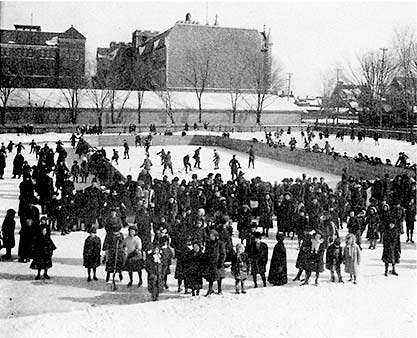 |
|
Institute hockey teams regularly won Junior, Intermediate, and Senior City League championships. Operating under the belief that "a school which neglects sports will inevitably decline in spirit and attendance," Lisgar teachers instructed the likes of Hockey Hall of Fame members Gordon Roberts, Jack and Harold Darragh, Alex Smith, Harry "Punch" Broadbent, and Frank Boucher in the art of hockey. Other notable hockey-playing alumnae of Lisgar include Jack Fournier, Letham Graham, Jerry Davidson, Norman Scott, Stewart Christie, Eddie Cuzner, Carson Kendall, Grey Masson, Gordon Johnston, Howard Raphael, Paul Armstrong, Basil Frith, Tom Lowrey, and Tommy Westwick. Athletic prowess and academic achievement would seem to have co-existed fruitfully at Lisgar in this era. During this era the Ottawa City Hockey Club, later called the Ottawa Capitals, competed in the Ontario Hockey Association League and then the Canadian Amateur Hockey League with considerable success, but not until 1902-03 was an Ottawa team able to win The Stanley Cup. At the start of that season, The Capitals were renamed The Senators, then nicknamed "The Silver Seven" in honor of the seven players on the team Bouse |
|
|
H.R.H. Princess Patricia and Major Worthington on "the small rink in the woods" at Rideau Hall, Ottawa, 1914. |
|
Hutton, Arthur Moore, Harvey Pulford, Frank McGee, and the three Gilmour brothers, Dave, Bill, and Suddy. The league playoff between The Silver Seven and the Montreal Victories was tension filled, while The Stanley Cup challenge match between Ottawa and Rat Portage was somewhat wild, as Bill Galloway in his newspaper feature "Ottawa Senators: The Glory Years" recounts: The Silver Seven and Montreal Victorias ended up the regular season tied and played off in a two game, total goals series which opened in Montreal on March 7th. This game ended in a tie. They played the second match in Ottawa on March 10th and Ottawa won 8-0. The ice was slushy and in no condition for a hockey game and was even worse when the Rat Portage (Kenora) team arrived in Ottawa to challenge for the Cup. The two game series opened on March 12th with ice conditions so bad that at one point in the game, the puck fell through a hole in the rink and could not be found. The teams stood around while 1500 screaming fans impatiently waited for another puck to arrive. The rotten ice did not stop Ottawa who won 6-2 and again defeated Rat Portage 4-2 on March 14th. A century-long tradition of tripping and slashing was begun during this period, and referees were dragged from the ice, bashed with sticks, hit with pucks. Indeed, play was so hard on officials that in a game between Rat Portage Westerners and the Ottawa Silver Seven the referee wore a hard hat to protect himself the fans roared each time it was knocked from his head. |
|
The Silver Seven, 1904-05. Champions of the World and Stanley Cup winners. Front row, LEFT TO RIGHT D. N. Finnie, goal; E. H. Pulford, defence; Alfred Smith, captain, right wing; Arthur E. Moore. Back row Harry Westwick, rover;M. H. McGilton, trainer; H.L. "Billy" Gilmour, left wing; and Frank C. McGee, center. Inset Frank C. McGee scored 14 goals in a 23-2 Stanley Cup victory over Dawson City. |
|
|
In 1904-05, The Silver Seven successfully defended The Stanley Cup from challenges by the Winnipeg Rowing Club, the Toronto Marlboros, the Montreal Wanderers, and the Brandon Wheat Kings, with Frank Patrick starring. Patrick's heroics could not overcome The Silver Seven, and before an audience of Lord and Lady Minto, at the Aberdeen Pavilion, the Ottawa team won the two-game series. That year The Silver Seven played in the Federal Hockey League, losing only one game, to Brockville. Again in 1905-06, The Silver Seven accepted challenges from afar in their defence of The Stanley Cup. Dawson City traveled 4,000 miles, part of the way by dogsled, to play The Silver Seven. Exhausted, they lost to what Brian McFarlane has called in his book, One Hundred Years of Hockey, "one of the greatest teams ever assembled." In the second game of the series Frank McGee set a record which stands to this day: 14 goals against Dawson city's seventeen-year-old goaltender Albert Forrest in a 23-2 game. One can only wonder how the renowned Silver Seven would have done if they had traveled 4,000 miles across ice |
|
Klondike (Dawson City) Hockey Team, 1905-06. The Klondike squad traveled 4,000 miles to challenge The Siver Seven for The Stanley Cup at Dey's Arena. Back row Hector Smith, George Kennedy, Lorne Hannay,Jim Johnston, Norm Watt. Front row Albert Forrest, Col. Joe Boyle, Dr. Randy McLellan. Not in photo Weldy Young (manager), Dave Fairbairn, H. Martin. |
|
|
and snow to play Dawson City on its home ground. The fatigue suffered by the Dawson City team was compounded by bad ice conditions. The Ottawa ice-maker, it has been said, slowed down the Dawson City team by flooding the ice with an inch of water, even though the temperature was well above freezing. Like race horses who do better on mud, The Silver Seven plodded through the slush to win The Stanley Cup for the third year in a row. With this third consecutive Stanley Cup victory, the Silver Seven Senators set a record which stood alone until the Toronto Maple Leafs won three consecutive Cups in the late 1940s and the Montreal Canadiens, led by Maurice "Rocket" Richard, won five consecutive N.H.L. championships in the late 1950s.
One of the most colorful players with The Silver Seven was Harry "Rat" Westwick who served as captain on the team and played on the first Canadian all-star team selected by fans in 1905. Harry once gave this explanation of the origin of his nick-name, "Rat":
We played in Quebec this night in 1896 and a couple of days after we were back in Ottawa George Patterson Murphy, the president of the Ottawa Hockey Club, produced a copy of The Quebec |
|
Harry "Rat" Westwick (left) was connected with Ottawa sporting activities for all eighty-one years of his life; with the Ottawa Capitals (lacrosse), with the Senators for three consecutive Stanley Cups 1902-1905, with the N.H.A. as a referee. His descendants continued to be associated with the Ottawa sporting scene.
The hockey career of "Peerless Percy"Lesueur (right) spanned fifty years but he gained his fame as goaltender for Ottawa Senators 1906-1913 including two Stanley Cup Championships, 1908-09 and 1910-11. He is credited with inventing the gauntlet-type glove for goalies and the net used by the N.H.A. and the N.H.L. from 1912 to 1925. |
|
|
|
|
Chronicle in a store on Sparks Street where the players used to gather. It contained an account of the game and the hockey writer had really given us a going over. He called Harvey Pulford "The Bytown Slugger," Weldy Young was "a thug," and Westwick a "miserable, insignificant rat." After that I was "Rat" Westwick.Bill Westwick, a relative of the "Rat," became one of the best sports-writers in hockey, covering the exploits of The Senators during the 1920s and 1930s as they struggled to match the achievements of The Silver Seven.
The 1906-07 Stanley Cup was won by the Kenora Thistles in a challenge match against The Silver Seven, and the Montreal Wanderers in turn challenged for the Cup in 1907-08, defeating Kenora. However, the Ottawa Senators reclaimed the honors in 1908-09, easily defeating the Wanderers, with a young Fred "Cyclone" Taylor and legendary center Marty Walsh leading the team. The Senators lost the Cup again in 1909-10 to their old rivals the Montreal Wanderers, only to regain it the next season in 1910-11, with a team boasting the likes of Marty Walsh, Percy LaSeur, Jack Darragh, and Captain Bruce "Hod" Stuart. The Senators not only regained The Stanley Cup from the Wanderers, they defended it from further challenges by teams from Galt and Port Arthur. And at the end of the season, The Senators toured New York City with the Montreal Wanderers, playing several exhibition games in front of appreciative fans. The Renfrew Millionaires followed this same circuit, with the "hi-jacked" Fred "Cyclone" Taylor starring, a year later. The Senators would not win The Stanley Cup again until the 1919-20 season, once the team had joined the N.H.L. once the team and the game of hockey had turned from amateur status to professional.
The relative merits of amateur vs. professional hockey was often debated in these years leading up to the creation of the N.H.L. in 1917. A fascinating Ottawa Citizen article, dated December 1909, entertained these arguments:
A good deal of public curiosity exists as to what professional lacrosse and hockey players get in Ottawa, now that straight professionalism is an accepted fact. In the olden days of athletics that is, of the period some twenty years ago, the players were supposedly amateur, but in quite a number of cases a 'divvy' was looked for at the end of the season and when a season was more than ordinarily successful this totalled to quite a respectable figure. There was no guarantee given as to the amount each was to get from the members of the executive, but the athletes expected to be fairly treated on the division of the surplus cash at the end of the season. It was understood that anyone who benefited this way would take a greater interest in the success of his organization. Capt. Bruce Stuart of the champion Ottawa hockey team was asked what the players are receiving at present for their series. He replied: "I cannot say as to that. Each player knows what his own arrangement is, but managers of clubs are very much like heads of commercial establishments who usually prefer to keep their employees ignorant as to what their fellow workers are in the habit of getting. The man who plays hockey gets what he is worth to any club and therefore, there can be no fixed scale." It is known however, that Tom Phillips, when with Ottawa, was reported to be getting $1,500 for the season, but it is certain that his salary fell far below that amount. In cases where a man's presence on a team is expected tî assure victory, large sums have been paid. |
|
Ottawa Hockey Club, 1908-09. Inside the circle and touching the cup, clockwise - C.B. Stuart, captain and rover; T. D'Arcy McGee, Pres.;L.N.Bate, Vice-Pres. On the circle, clockwise A. Kerr, left; Fred (Cyclone) Taylor, center point; M. Walsh, center; H.L Gilmour, rover; C.J. Bryson; P.M. Buttler; M. Rosenthal; P.J. Baskerville; N.C. Sparks, D.B. Mulligan. E. Dey, spare; Percy Lesueur, goal; T. Lake, point. Outside the circle, clockwise M.H. McGilton, trainer; P. Green, Coach; Dr. S.M. Noble; H.M. Merrill. |
|
|
Art Ross, the captain of the Montreal Wanderers, is known to have received from Cobalt the sum of $1,000 for two matches against Haileybury. Tom Phillips of Kenora and Ottawa fame received $600 for two matches in Montreal. The ordinary man receives in the neighborhood of $600 for a season of twelve weeks.
By the time the First World War ended, The Ottawa Senators had joined the N.H.L. as a charter member. The City of Ottawa soon became the capital city of professional hockey during the glory years of the 1920s.
There have been four generations of Kirbys in the insurance business in Ottawa, one of them being the famous hockey player, Chauncey T. Kirby for whom J.R. Booth, King of the Timber Barons, struck a medal, still cherished in the Kirby family. I taped John D. Kirby, Chauncey T. 's son, at home in Ottawa less than a year before his death in 1990:
In the 1890s my father, Chauncey T. Kirby was playing hockey for Ottawa and I think it was the old Foulkes Arena, corner of Elgin and Laurier. The Stanley Cup was a challenge cup; it wasn't a league cup. You had to defend it every week. I went to see a hockey match when I was old enough to go out in the evening around 1911 and it was a challenge to Ottawa who were holding The Stanley Cup and it was a challenge from Galt. They had come all that way to challenge Ottawa. And they got beaten. I was there and that was in Dey's Arena. All I can remember about it was it was a good clean game, no rough-house at all, and I can remember that the goaltender for Galt was a fellow named Hay .. . That Dey's arena, it seated over two thousand and the arena was always full. There was a crew of firemen walking underneath the stands with fire cleaners, chemicals to put out fire, smother it. When my father moved to Montreal to work in the bank he played hockey for Montreal. Then he came back from Montreal in 1907 he got fed up with the bank and he didn't play hockey anymore. He refereed. There was another story that I want to bring in here. One of the last years he was playing hockey, the Ottawa team was on its way down to Montreal to play the Montreal Amateur Hockey Association and this was the last of the amateurism. Harvey Pulford wanted to be paid for playing with the Ottawa team in the game against Montreal. And this was announced when they got to Montreal. Chauncey T. Kirby was then on the management end of the team and C.T. said, "Fine, he wants to get paid. Well, he's not going to get paid and he's not going to play and he's not going to get back." And so Pulford didn't get the return ticket to go back. And that was the last of Chauncey's involvement with the hockey club, because it was a departure from the true amateurism that he believed in "the Gentleman's Game" where they bought their own uniforms, they bought their own skates, and they bought their own sticks, and often their own tickets to wherever they were going although they had a fund usually of hundred dollars for that they were going although they had a fund usually of hundred dollars for that. My father refereed till about 1912. The Sims place where he was managing was open on Saturday night till nine o'clock and afterwards he went to the rink to referee. And he had done a day's work and he was pretty tired, I would say. Anyway, you know how the players and referee get messed up on the boards once in |
|
"In the good old days" Ottawa had some whopping snow storms which brought the entire city to a standstill. Dave Gill, Manager of the Ottawa Senators and an executive with Frank Ahearn in the Ottawa Electric Street Railway, was renowned for inventing machinery to clear the tracks, like the one shown here. |
|
|
a while? Well, one night they got mixed up and messed up with Chauncey T. three or four times. Anyway, when we came home I dunno what the result of the game was but anyway, my brother and I said to him, "You didn't have much luck on the boards, Dad?" And he said, "No." And one of us said, "Well, you really messed up a couple of plays." He never refereed again. When the criticism came from the two boys from his own family he signed off. And, of course, the referees didn't get paid. They did it for love. But dad once got one hundred dollars and his transportation to go and referee a game in the Silver Mining League between Cobalt and Haileybury. I saw Art Ross play at Dey's Arena. Art Ross was playing for the Wanderers. But, anyway, he said it was really for blood to play at Haileybury. And Ross said after the game they had to tie their skates and sticks, strap them together as weapons, and then swing them back and forth to fight their way through the angry crowd. But my father was the referee all he had was his skates and blades to swing back and forth to defend himself! He got out of Haileybury as fast as he could. In fact, I think, he must have caught the train at North Bay which would be coming down to get into Ottawa around six o'clock. He never refereed up there again. That was it. The medal J.R. Booth gave to Chauncey T. Kirby, center for the Ottawa City Hockey Club, is an eight-pointed star. The center would fit onto a bar that you'd pin on your coat in the form of a medal. On the back it says:
Champions of Canada Presented by J.R. Booth, Esq. to C.T. Kirby, Centre |
|
|
By the turn of the century Ottawa, Hull, and the Alymer Road were dotted with mansions built by hockey enthusiast J. R. Booth, "King of the Timber Barons," and his family. This one on Metcalfe Street is now the Laurentian Club. |
|
Other fellows who played on the team got medals at the same time. There was my uncle, Dr. H.S. Kirby, and there was Jenkins now that's the famous curler, afterwards. There may have been a couple of Gilmours on it. P.D. Ross did some management of the hockey club, but he didn't play ... There's a very interesting thing about Cyclone Taylor. Now, Taylor went to New York once on an exhibition team with the Renfrew Millionaires to play the Montreal Wanderers, and they compared he was getting a pretty good salary and they compared the number of games he played in the season with a champion baseball player of his time and Taylor was making double the money per game that a baseball player was getting. You see, in those days hockey players never played more than Saturday and Wednesday nights. I was around when the Auditorium was built and when The Senators were born and when they died, and I think this is my own personal opinion I think their demise was hastened by the location of the rink. Dey's Arena, where they were before, you got off at Laurier and Elgin on the Elgin street car and you walked a block to the rink. And also, you could get off at Canal Street and walk down Canal Street and come into the Rush End. Now the other part of the thing is that nobody in the name of God knew where Argyle Avenue or O'Connor Street was. O'Connor Street was a quiet street, you couldn't get through at Catherine Street it stopped at Catherine and then the cars went out Bank Street and you had to catch Gladstone Avenue to get down to the rink, or it went through on to the subway before the next stop at |
|
The Alexander Hotel and the Gilmour Hotel were two Centretown bars on Bank Street where athletic enthusiasists and hockey fans dallied and drank in the "Men Only" room. The Alexander was demolished in the 1970s and only the Gilmour building remains with its ghosts of Ottawa's hockey greats telling tales. |
|
|
Pretoria. It confused people all the time. You'd have thought Frank Ahearn who owned The Senators and the streetcars could have said, "We'll put a stop here at Argyle so they can walk into the rink." I mean, after all, it was his money that was going down the drain. We'd go to the City League as well because they had Ted Reid there, and also Wes Richards who played for the Shamrocks, and it was Jim McCaffery who used to manage that team then. A pair of season tickets cost about $125.00. Wes Richards played for the City League Shamrocks team and then he went into the Senator organization during the golden years. He coached The Senators for one year, and I remember going to watch the Ottawa Senators in 1923-24. It was the first season Frank Finnigan played, and we had second row seats. He could really zing one and you'd feel the boards bounce really zing one and you'd feel the boards bounce.
Mrs. John B. Kirby also has fond memories of early Ottawa hockey life, which for her had a somewhat romantic aura about it:
I grew up in Ottawa in New Edinborough. I met John in |
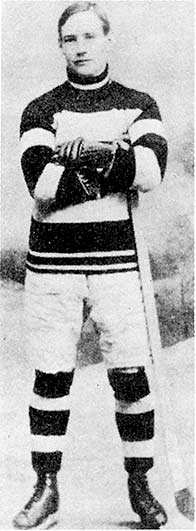 |
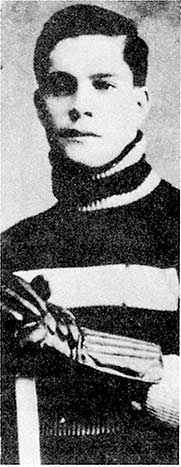 |
Another
Ottawa born star of the early Ottawa Senators, Bruce Stuart (left)
played forward for his home team on two Stanley Cup Championships,
1908-09 and 1910-11. Stuart once scored six goals in a game against
Quebec.
H.L. Billy Gilmour(right) was born in Ottawa, 1885, and was a member of the famous Silver Seven for three consecutive Stanley Cup victories, 1902-03, 1903-04, and 1904-05. When the renamed Senators won the Stanley Cup in 1908-09, Gilmour finished the season with 11 goals in 11 games. |
|
1922 or '23 on a mutual date. He'd just bought a new car and he met a young fellow friend of his in the Glebe and wanted to take him for a ride in his new car. And the young fellow friend said, "I know a girl down in New Edinburgh, let's go down and get a couple of girls." I was a working girl by 1922. My very first job was at the age of fifteen. I took an intensive course of shorthand at Mrs. Rolls Shorthand School on Bank Street, about over where the National how to type. So I took this course because my sister was working temporarily at the Japanese Consulate and she was going to have her first and only child. So she said, "If you learn shorthand you can have this job after me. It pays ninety dollars a month and you only work four hours a day. Ten to twelve and two to four." Consulate hours, you see. At the corner of Sussex and Rideau. So that was my first job. But when I met John in 1923 I was up in the Senate. I did one session, after the spring session. I worked for Sir James Lougheed who was the Conservative Leader in the Senate and he was an old man then. I met John, and he came round, and asked me to go to a hockey match the only one I'd ever been to was Juvenile, you know.But he took me to the Auditorium to see the City League, The Shamrocks. And we sat next to Mr. Seldon. The Kirbys had their regular seat there. We were sitting there a while and John said to me, "There's my father across the rink." I said, "I can't see very well." So Mr. Seldon handed his binoculars to me and I looked and there was this tiny man. Sure enough, in five minutes he was across the rink to meet "the redhead." His son had never gone out with a redhead before. But he knew what redheads were like because he had cousins that were five boys in the family ... You can gather from this that I was a little on the flarey side. When he took me to the match I had Oxfords on. It was wintertime and I wanted to look nice and I had long woollen socks on that ended here of course we had long skirts. They were low, and John said to me, "You're coming out in the wintertime with those on?" But he had a car and he had the finest place to park the car because the Auditorium was at Argyle Avenue there. So we parked up on the Museum grounds somewhere and I had to pick my way in, and I only knew him about a week or so then. Well, we had met in September so it was a little more than a week, I guess. I know he remarked on me not wearing rubbers in the wintertime. So, he might have known what kind of a witch he got. That was our first date a hockey game.
Phoebe McCord of Shawville, Quebec, stands out as one of the greatest storytellers in my experience. She really could tackle and enrich almost any subject, but here she describes unforgettably a riot in the Rush End in the early days of hockey in Ottawa:
The Kilreas of Ottawa were relations of ours. The first Kilrea, Jack, was an Irishman, pure Irish, over from Northern Ireland. He got work in a lumber camp with my uncle, John Armstrong, a big handsome man. And John Armstrong brought Jack Kilrea home with him because Jack had no place to go. And then with his bride, Sara Armstrong, Kilrea moved to Ottawa and got work with J.R. Booth oh, he was poorly paid and he |
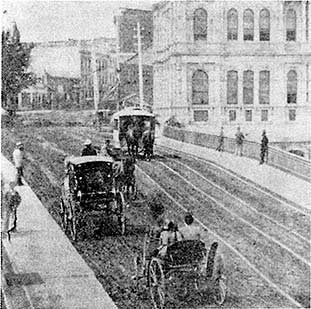 |
Horse-drawn cars were Ottawa's first public transport. |
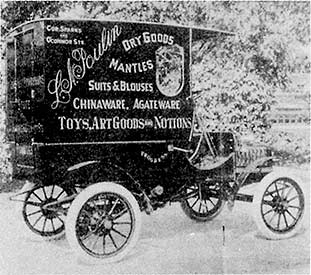 |
This primitive vehicle (a 7 h. p. single chain drive Rambler) was purchased by Mr. L. N. Paulin in 1902, and in 1905 was fitted with an adjustable top for business purposes. Note the old-fashioned lantern-type headlights. |
|
bought a little house on Laurier Avenue West. It's still there just off Bank Street and they had a little back yard. And Kilrea was having this large family. Fourteen they had, you know. Anyway, he was an Irishman and he was an Orangeman. And he rose on the Twelfth of July before sunrise. At the first gleam of the sun he would be out there in the back yard in his "couth." And he had a revolver and he'd be firing shots into the air and yelling, "Hurray for King Billy! Hurray for King Billy!" At the top of his voice and already drunk! Yes, he would already have had two or three good shots of whiskey. He collected whiskey for the Twelfth, the glorious Twelfth; he wasn't drinking beer that day! And the police would come. In those days they were all Irish Catholics not now though and they would come and say, "Now, Mr. Kilrea, you mustn't make such a noise." And Jack would yell, "Get out of here or I'll drill you full! Hurray for King Billy! Out of my backyard, you damn Dogans!" And the police would say, "Kilrea, you are causing a disturbance " And he would shout, "Are you a Dogan?" "No," the policemen would say, "we're Catholics." And he would say, "To hell with that! You're all damn black dogans, every last man jack of you! Out of here or I'll drill everyone of you!" And the policemen would go partly because he was armed and partly because he was a fiercesome-looking man. He wasn't a big man but he was full of presence and he had yellow curls and a great yellow whisker. Another reason the policemen would go was because Jack Kilrea was the father of the later-famous Íåñ Kilrea of the Ottawa Senators. Every Twelfth of July, Jack Kilrea petrified his neighbors. But the police stopped coming to his place on the Glorious Twelfth. "Oh, it's just Jack Kilrea," they would say when the complaints came in. "He doesn't shoot at anything. He just shoots up into the sky!" Jack Kilrea was an Orangeman first, last, and always. For years the Kilreas lived from hand-to-mouth on Laurier Avenue. But then some of the girls got work and got married, and Íåñ was making all that money with the Ottawa Senators during the twenties and early thirties. And one Kilrea married a Jewish lady and when the first child was born her Jewish grandfather gave her a white mink hat and coat. It was the talk of the town. The Rush End at old Dey's Arena in Ottawa was a section at both ends of the rink where you stood up all night. But that didn't matter. You were watching the Montreal Maroons play the Ottawa Senators and Aurel Joliat was playing. Oh my, that little wee Frenchman! Absolutely gorgeous! And my uncle Jack Kilrea was there, of course, in the Rush End, telling everybody around him that that was his son down there, big, blond Íåñ Kilrea. Jack would be having a few, maybe even had managed to save up some whiskey for the game, and he'd get bragging in a very loud voice: |
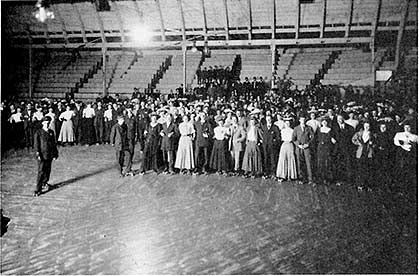 |
Roller skating emerged as yet another summer sporting event at the turn of the century. This is a Topley photograph of a 1907 roller skating crowd assembled at an Ottawa covered rink. |
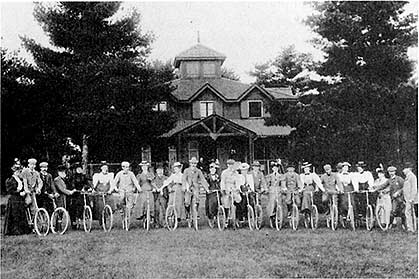 |
Thå bicycling craze which seized Ottawa in the Gay Nineties continued for thirty years until superceded by the motor car. This is a group of Ottawa cyclists taken opposite the summer cottage of Mr. E. Mial, Aylmer, Quebec, 1898. destination for Ottawa boaters, skiers, cyclists, hikers. |
|
"That's my boy down there." And somebody would answer him with a vile insult, or slanderous French, and they would be into it. And more and more people would be into it, taking sides until the whole Rush End would be in a melee everyone fighting and hitting and cursing and swearing, in both French and English! Oh, it was audience participation in the truest sense of the word!
The Charlie Conacher Cancer Research Fund two-hundred-and-fifty-dollar-a-plate fund-raising dinner is traditionally held in Toronto on St. Patrick's Day. To ensure my father's attendance at the 1987 dinner, Harold Ballard conscripted fake Dunlap to be my father's escort. Jake drove him to Toronto, attended to his every whim in Toronto / understand they even had a sentimental journey down Yonge Street and into the Maple Leaf Gardens and then brought him home again safely. Although they are a generation apart, the time gap between Dunlap and Finnigan was bridged by incredible enthusiasm and detailed memory for the city of Ottawa in the days when it was the sporting hub of the country.Such a sports-minded community provided fertile ground for the growth and encouragement of young athletes and for the perpetual increase of supporting fans, both of whom are so necessary to the development of sporting activities and organizations. I have always maintained that Ottawa was also the capital city of hockey for North America, and I was therefore not surprised when Jake Dunlap came to the interview with Frank Finnigan seemingly intent upon demonstrating the fact that at one time Ottawa was "the seeding ground" for hockey champions and the great teams of North America. Jake Dunlap was born in Ottawa, one of the sons of Ann Elan and Henry Joseph Dunlap, originally from Cape Breton. He was educated at St. Patrick's College, Ottawa University, and Osgoode Hall, practicing law in Ottawa until his appointment in 1987 as Agent General to the United Slates for the Province of Ontario, based in New York City. An all-round sporting man, he played hockey as a junior for St. Pat's and as a senior for the Ottawa Senators in the Quebec Hockey League. His football career encompassed twelve years with Toronto, Hamilton, and Ottawa. After his return to Ottawa from his position in New York, Jake Dunlap, along with Val Belcher and Larry Brune, two football players from Houston, Texas, opened the very successful Lonestar Restaurant in Ottawa, where, he used to say, "the men are men and smell like horses." The Lonestar was sold several years ago, smell and all:
Jake: Harold Starr and Carl Boucher, one of the famous Boucher brothers, got in and out of the bread business in Ottawa pretty fast. Carl usually worked as a printer for the The Ottawa Journal, |
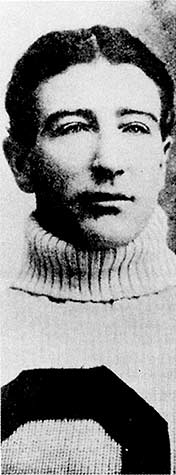 |
 |
Alfred
E. Smith (left) was the eldest of seven hockey playing brothers of whom
only three achieved professional status. Born in 1873 he played with the
Ottawa Electrics and the Ottawa Capitals before joining The Senators in
1895. He played right wing with Frank McGee at center for two Stanley
Cup Championships in 1903-04 and 1904-05.
Thomas J. "Tommy" Smith (right) was born at Ottawa in 1885. Like all his brothers he played school and Junior hockey in Ottawa, then went on with The Victorias and The Senators. He twice scored nine goals. |
|
but one summer he and Harold Starr decided that they would go into the bread business. The very first day Harold loaded up the truck and headed up the Gatineau where, 'twas anticipated, he was going to make a fortune selling to all the cottagers as well as the regulars. Well, round about Wakefield Harold got into the hotel there, and somehow during a very long, pleasant afternoon lifting his elbow he traded his whole truckful of bread for a canoe. End of bread business . . . Remember Sid Howe? He had a sporting store in Ottawa. Frank: And his uncle had before him. Jake: I grew up in the Glebe on Second Avenue, and you know where Mutchmor School is on Fifth Avenue? Well, just west of Bank Street on Fifth there is a house and a hockey player lived in there, a good hockey player. |
|
Gordon Roberts (left), a great leftwinger, was one of those rare individuals in his era who managed to play professional hockey while getting his medical degree at McGill University. He played for Ottawa in 1910 and while at McGill played six seasons with Montreal Wanderers. He later practiced medicine on the West Coast and played for the Vancouver Millionaires.William H. "Hod" Stuart (right), brother of Bruce Stuart, played for Ottawa Capitals at the turn of the century before signing with the Quebec Bulldogs. He died tragically in a diving accident in 1907 at the height of his career. |
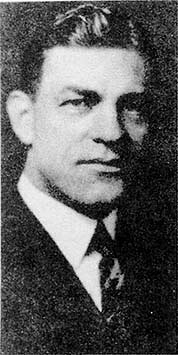 |
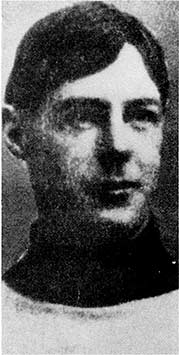 |
|
Frank: Pete Howe. Real shifty. Played for City League team, Rideaus or New Edinboroughs Little Pete Howe, one hundred and thirty-five pounds. Jake: And Harold Darragh lived around there Thornton or Ralph Street, near Lansdowne Park. Hero worship! We were full of it! Ottawa was full of hockey players in the summertime and we used to follow them around. What else was there to do? We read about them all the time in the papers, and then we'd go to the park and some of them would be playing hardball. And if we ever got a chance to meet one of them well! I can remember Bill Cowley, walking home and seeing him they lived in the Glebe on Powell Avenue near Branson and the odd time, you know, he'd go by and we'd all follow him down the street: "Geez, there's Bill Cowley!"Of course, he was one hell of a hockey player. He "made" more wingers than anyone I can think of. I can remember talking with Lorne Duguid and I said to him, "If you see Bill Cowley, thank him. He kept me in the league." And Roy Conacher Cowley made Roy Conacher the scoring champion one year. Cowley was the center-ice man and he'd pass it he'd be fooling around and he'd get them in position and bang! into the net! |
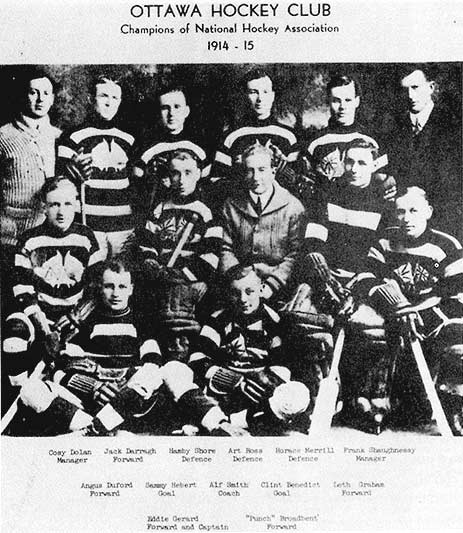 |
This old photograph of the Ottawa Hockey Club of 1914-15 contains many of the hockey "greats" in Ottawa who acted as role models for Frank Finnigan and, later, as hockey heroes for Jake Dunlap. |
|
You know who I got very friendly with in Toronto was Cy Wentworth. Dead about three years. Nice fellow. He played defence with The Maroons. He was sales manager for Labatt's Brewery. And Bill Ward, who was assistant sales manager for Labatt's, and I lived in the Wentworths' house when I was going to law school in Toronto. So I used to see Cy, and Cy always used to talk about "Big Pete" Allen Shields. Cy used to tell me, "That's the toughest son of a bitch I ever met," meaning Shields. Shields went blind later in life. Frank: Harold Starr gave him an awful trimming at Harold Starr's hotel in the West End. Allan bothered him, really bugged him. Harold wasn't quarrelsome at all, but if he got something in his head like, "I think that son of a bitch insulted me," he'd go looking for him. Allen was an agitator. Jake: But last time I saw him, I was driving somewhere in the city and there was "Big Pete" Allen Shields on the corner. So I picked him up he was living then in Britannia and he was waiting for a bus and I went in and had a beer with him; he was going blind then. Frank: Well, there might have been a few old-timers who ended up on their uppers. Only a few . . . Jake: Fred Connor and Harry Connor a hell of a good fellow, Connor Washing Machines. And Fred "Crew" Connor, he never played for the National Hockey League but he played for Rovers. But Harry Connor, he was doing so well, I remember, corner of Bank and Laurier, and he had appliances. Then they went into the Connor Venetian Blinds and they used to sell them up The Valley, all the hotels and the hospitals. Harry bought a place, they were doing pretty well, 27 Powell Avenue, and 1 can remember going in to see Harry there, and do you know what he drank? Burnett's White Satin. Oh Lord, he drank! Frank: Oh Lord! He drank a lot! Almost as much as I did in my drinking days! Jake: Nothing at all to be sitting down at the store in the morning drinking Burnett's White Satin, both Fred and Harry. Frank: The Kilrea girls were good-looking. Well, they were blond, you know, and in those days to be blond, well. .. Jake: Kenny Kilrea was a hell of a hockey player, the youngest of the Kilreas. He was going to Glebe, he married a Simon girl, Simon the Furriers. Now old Simon had, I think, three girls: Julie, Frances (Frankie), and Sylvia. Frankie Simon, a beautiful girl, married Kilrea when they were only in Fifth Form. The Kilreas lived on First Avenue, then they divorced. They were only kids when they got married, eighteen and sixteen Kenny and Frankie. You know why the New Edinborough Canoe and Tennis Club was such a hangout for all the athletes in those days? So popular? I'll tell you why. They used to walk across the ice to buy beer and liquor in Gatineau Point and bring it back. Frank: Dave Gill was a great supporter of the New Edinborough Canoe Club and so was Jess Ketchum, old Jess .. . Jake: Frank, the reason you and I get along so well is because I'm Catholic and you're Protestant. Frank: Clancy and I never made any difference. And Alex Connell and Nighbor I roomed with them and we never made any difference. And Buzz Boll was an RC from the West. I roomed with him. |
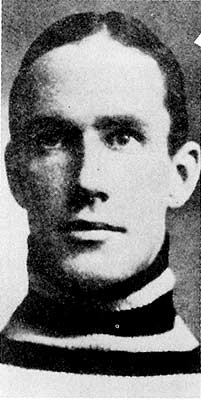 |
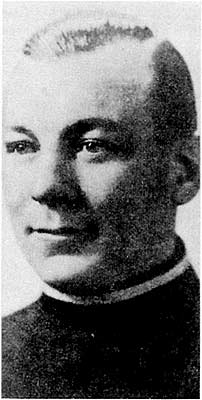 |
Harvey
Pulford (left) was outstanding in football, lacrosse, boxing, paddling,
rowing, squash and hockey. Although born in Toronto in 1875, he spent
most of his life in Ottawa playing Championship football for the Rough
Riders, championship lacrosse for the Capitals, and championship hockey
for the Ottawa Senators.
Born in Ottawa in 1892, H.L. "Punch " Broadbent (right) began his hockey career with New Edinburghs and Cliffsides before moving on to the Ottawa Senators for the 1912-13 season, scoring 21 goals. He was on four Stanley Cup teams three with Ottawa and one with the Montreal Maroons. |
|
Jake: Alex was my coach when I was at St. Pat's hockey. At the last he was soliciting business for a transport company, just a little job he had. Alex was such a gentleman. I can remember Kay, his wife. Frank: They had one little girl and she got in a dreadful accident down on Rideau Street. Alex Connell was the secretary of the fire department and Gray Burnett, who was our neighbor on McLeod Street, he was fire chief. Jake: I want you to try and name as many people as you can remember, because when everybody came home to Ottawa in those years from playing in the National Hockey League and the Western League, or the seniors or the semi-pro American league in the States, in the summer that was when things really lifted in Ottawa. The guys were home, they didn't have to play any more, Frank: Des Smith, Lionel Hitchman, Bill Cowley, all the Bouchers four of them, Frank, Billy, Buck, George. Joe sold a correspondence music course, Carl didn't play hockey. Five, no, just four Bouchers Bobby, yes, five. There were six brothers. Now get into the Kilreas: Kenny, Íåñ, Wally, Jack he ran the camera shop Brian played for Eddie Shore down in Springfield. Jake: Right next to Kilrea's Camera Shop was Stewart's poolroom. It was called "The Sewer" and all the gang played pool there. CPP Telegraph was at the corner. Frank: Crafty Crawford, Justine Bow, and then there was Ebbe Goodfellow, a hell of a hockey player, Harvey Rockburn, Ted Lindsay from Renfrew, the Cleghorns, Harold Darragh, Jack Darragh, Eddie Gerard, Punch Broadbent, Cy Denneny, Eddie Gorman from Buckingham, Newsy Lalonde, Les Graham, Des Smith, Roger Smith his brother played for Pittsburgh same time as Lionel Conacher played over there before he went to The Maroons Lew Bates, Eddie Finnigan, Joe Matt went over to the States later Jack McVicker from Renfrew went to The Maroons, Ray Kinsella, two Conn boys played for Toronto, Maddie Cullin, Quackinbush, Gordie Bruce played for Boston, Hank Blade, Tony Lecarie. Jake: All these guys that played pro, semi-pro flooding back into town, into Ottawa for the summer in the '30s. When April came, they all got together. "How are you going?" The camaraderie that existed at that time was wonderful, exceptional. Frank: Art Gagnier, Lionel Hitchman played for Boston. A lot of people say he made Eddie Shore as a scorer because they wouldn't go near Hitchman, defence, a tough son of a bitch, long reach, raw-boned, hard to go around but he never carried the puck fast a good blocker. Alex Connell, King Clancy, Clint Benedict, Bert McKinley oh, so many! Jake: And Ottawa wasn't a big city then, about twenty thousand and you had that many players coming home every summer. Bill Touhey, D'Arcy Coulson, Harold Starr, Allen Shields, Gerry Lowry, all the Lowrys, Frank Lowry, brother of Tom Lowry of The Ottawa Journal, a great guy. Gerry Lowry told me one time that he was involved in a cup final and he threw a stick and they lost 1-0 and they never even put the puck in the net. You were automatically awarded a goal if you threw your stick in those days. Louis St. Denis, Gordie Bruce . . . Frank: We played ball, tennis, golf. They all had jobs in the government. We had leave. I got leave from Ottawa Electric, but I got paid all year. The Ahearns, Eddie Gorman Buckingham.Jake: Aurel Joliat. You can imagine in the doldrums of the '30s, in the height of the Depression, suddenly all these guys swarmed back home. You can imagine what were they going to do. That's why some of them got into the bread business, or played ball over at Lansdowne Stadium, or went to The Whip, a place in Hull right next door to Madame Burger's. When you went over the Interprovincial Bridge on the right hand was the Empress Hotel, on the left was Beal's garage and the Regal. That was a great spot the Regal; all the guys met there Sunday morning. "Everything's legal at the Regal," they used to say. Frank: The Coulsons owned almost every hotel in Ottawa and Hull, them and the Barnabys. The old Alexander Hotel on Bank Street . . . they say millionaire M.J. O'Brien of Renfrew and the boys met there to form the National Hockey League. Jake: Could well have been, because the Russell and the Alexander were the two oldest hotels in Ottawa. The Barnabys fixed up the Gilmour. Frank: When I was playing hockey for Ottawa University, 1921, Coulson was backing the hockey club. Jake: Ottawa University was an Irish university. Then the French came in. St. Pat's College was built for the Irish. St. Joseph's Church on Laurier Avenue is across from Sacred Heart. And where is the front door to St. Joseph's? Well, it's not on Laurier; it's at the side, because they wouldn't face each other directly. There was a fight between the Irish and the French . .. Frank: When I was there the two head priests were Father Legault and Father Cleary, one French and one Irish. And that was in the old building right on Laurier Avenue. And my picture, if they haven't taken it down, is still there. Jake: King Clancy's father, Tom, taught there when he was a young academic. And old Tom Boucher, father of all the Bouchers, ran a hotel, played football and after a game he'd get out on the hotel veranda in Lowertown and they'd all cheer him and he'd wave. He played for Ottawa University; it was in the big league then. Frank: A good Protestant that played for Ottawa U was Bob McCredie of Shawville. He played with Tom Clancy and Tom Boucher. King's dad got to be quite a drinker like a lot of hotel keepers and King's dad said, "Son, if you promise to never take a drink, I'll never take another drink." And that's why Clancy was a teetotaller. Jake: But lots of times people would think he was half-cut because he was such a cut-up . . . Jake: And there was Johnny Wilkinson. I chink he played in Boston one year, but he played over in England a lot. Frank: At that time they had a league over there and a lot of fellows that were single went over there. They were not going to make the National Hockey League; there were only six teams. Jake: So they had the choice of playing in the City League and get relatively nothing or go to England. |
|
J.P.Jack Darragh (left) at his peak was a member of the "Super Six" in a lineup with Clint Benedict, Cy Denneny and Sprague Cleghorn. He jumped from Cliffsides to Ottawa Senators in a championship year, 1910-11, and went on to win three more Stanley Cups. He never played for any other city but his home town.
E.G. "Eddie" Gerard (right) was born in Ottawa in 1890, He joined the Ottawa Senators in 1913-14 and became team captain in 1920-21. Winner of four Stanley Cups he finally retired in 1934-35 when The Senators were sold to the St. Louis Eagles. |
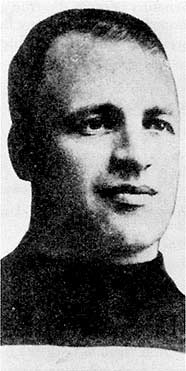 |
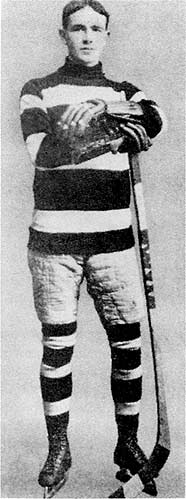 |
|
Frank: Oh yes, there was Leo Gravelle from Aylmer; Joe Matt from Buckingham; Bill Phillips from Smith Falls; Hank Stavenough, Arnprior; Lorne Anderson, Renfrew; and Larry Gilmour, Thaine Simon, and Roy and Jack Geisebrecht, and Harry Cameron of Pembroke ... Jake: And Dave Martel, Morley Bruce, Roly Hurd, Sam Godin, Hib Mylks, Bob Boucher, all of Ottawa, and Murph Chamberlain of Shawville, and Johnny Sorell, Cornwall . . . And Connie Brown, Terry Murray, Hambly Shore, Harry Hullman, Spiff Campbell, Gene Chenore, Milt Halliday all of Ottawa.
These players all of Ottawa went on to star with The Senators during the "Roaring Twenties" and the "Dirty Thirties," winning The Stanley Cup four times during the first decade of the N.H.L. The Senators became the true champions of the world, unrivalled in their achievement until the 1950s when the Montreal Canadiens would win five consecutive Stanley Cups. |